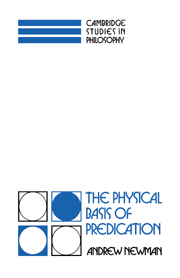Book contents
- Frontmatter
- Contents
- Acknowledgements
- Introduction
- Chapter 1 “Real constituents of the world”
- Chapter 2 What can logic and language tell us about reality?
- Chapter 3 The “existence” of universals and the notion of possibility
- Chapter 4 The causal significance of basic attributes
- Chapter 5 Hierarchies of universals
- Chapter 6 Causal relations
- Chapter 7 Arbitrary particulars and unified particulars
- Chapter 8 Further considerations concerning the causal relation
- Chapter 9 Arbitrary particulars and physical objects
- Bibliography
- Index
Chapter 4 - The causal significance of basic attributes
Published online by Cambridge University Press: 04 May 2010
- Frontmatter
- Contents
- Acknowledgements
- Introduction
- Chapter 1 “Real constituents of the world”
- Chapter 2 What can logic and language tell us about reality?
- Chapter 3 The “existence” of universals and the notion of possibility
- Chapter 4 The causal significance of basic attributes
- Chapter 5 Hierarchies of universals
- Chapter 6 Causal relations
- Chapter 7 Arbitrary particulars and unified particulars
- Chapter 8 Further considerations concerning the causal relation
- Chapter 9 Arbitrary particulars and physical objects
- Bibliography
- Index
Summary
BASIC UNIVERSALS
I have distinguished statements that say “there is” a universal from statements that say a universal occurs. If “there is” a universal, then it is possible that it occur any number of times, or not at all. The central characterization of the notion of universal is in terms of this possibility of multiple occurrence. This notion of occurrence is a primitive, intuitive notion based on a commonsense view of the world, but it is by no means alien to a scientific view of the world. The shape or mass to be found here, instanced by one object, is also to be found there, instanced by a second object. The shape or mass occurs in the sense that it can be “found”.
In order to elucidate the notion of occurrence, or being found, it is natural to turn to causality. If a certain shape occurs, or is found, then we can interact with it in some sense, and it should be regarded as causally significant. If the shape of a body is changed from spherical to ellipsoidal, for example, then the particular concerned will interact causally in a different way. It is likely therefore that causality will be some sort of guide to the ontological status of universals.
There are some predicates that appear to signify universals that are significant for causality, but that are dependent on other universals.
Information
- Type
- Chapter
- Information
- The Physical Basis of Predication , pp. 73 - 99Publisher: Cambridge University PressPrint publication year: 1992
